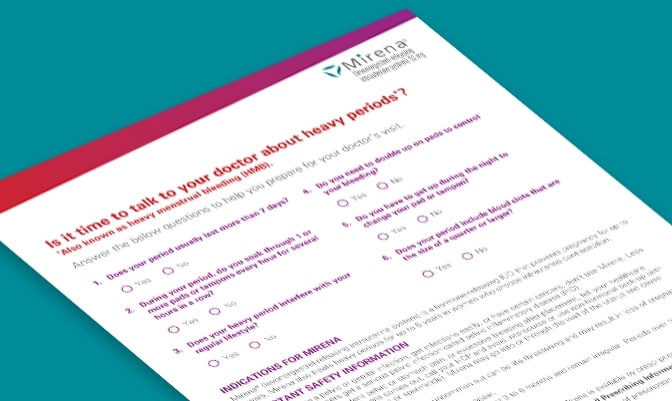If you have heavy periods, you know all about seeing red
Did you know that 1 in 3 women experience heavy periods? Mirena IUD prevents pregnancy for up to 8 years, and also treats heavy periods for up to 5 years in women who choose an IUD for birth control.
Mirena is highly effective at reducing heavy periods
In a clinical trial of Mirena in women with HMB, Mirena rapidly reduced heavy periods.
The majority experienced:
Mirena may also affect heavy periods in other ways
In some women with heavy bleeding, the total blood loss per cycle progressively decreases with continued use. The number of spotting and bleeding days may initially increase but then typically decrease in the months that follow. Bleeding may also continue to be irregular.
You may have bleeding and spotting between menstrual periods, especially during the first 3 to 6 months. Sometimes the bleeding is heavier than usual at first. However, the bleeding usually becomes lighter than usual and may be irregular. Call your healthcare provider if the bleeding remains heavier than usual or increases after it has been light for a while.
About 2 out of 10 women stop having periods after 1 year of Mirena use. If you have any concerns that you may be pregnant while using Mirena, do a urine pregnancy test and call your healthcare provider. If you do not have a period for 6 weeks during Mirena use, call your healthcare provider. When Mirena is removed, your menstrual periods should return.
How does Mirena treat heavy menstrual bleeding (HMB)?
Typically, this is how your period works:
- every month, the lining of the uterus thickens during the first half of your menstrual cycle to prepare for ovulation
- if ovulation takes place and the egg is not fertilized, the thickened uterine lining is shed as menstrual flow
- on average, a woman's menstrual flow lasts 3 to 5 days. It may be shorter or longer, depending on the woman
A Mirena can reduce your heavy periods by thinning the lining of the uterus. In a clinical trial performed in women with heavy menstrual bleeding that were treated with Mirena, almost 9 out of 10 were treated successfully ― with their blood loss reduced by more than half after 6 months.
Myths & Facts about Mirena
Fact!
Because Mirena is placed in the uterus, not the vagina, you can still use tampons or menstrual cups while using Mirena.
Myth!
While a Mirena is over 99% effective at preventing pregnancy for up to 8 years, it also treats heavy periods for up to 5 years in women who choose an IUD for birth control.
Fact!
Mirena can reduce heavy periods for up to 5 years in women who chose an IUD for birth control.
Keeping it real: what actual users are saying about Mirena
Listen to what these women have to say as they tell their story and share their real experiences with Mirena.
The women shown below use or have used Mirena and have been compensated for their time. Individual experience may vary.

“Now that my heavy periods are reduced, I don’t need to wake up during the night to change my tampon” - Influencer Reneze (@sincerelyreneze) on using Mirena for birth control and for heavy menstrual bleeding treatment

“Two years ago I got the Mirena IUD. It’s been one of the best choices I’ve made for myself since talking with my doctor.” - Influencer Violet (@violetsummersby) on using Mirena for birth control and for heavy menstrual bleeding treatment

“I talk to my patients who have heavy periods and want an IUD for their birth control about Mirena. If you have questions about heavy menstrual bleeding or the Mirena IUD, talk to your doctor...” - Dr. Nicole Alicia (@nicolealiciamd), MD, a Board Certified OBGYN
INDICATIONS FOR MIRENA
Mirena® (levonorgestrel-releasing intrauterine system) is a hormone-releasing IUD that prevents pregnancy for up to 8 years. Mirena also treats heavy periods for up to 5 years in women who choose intrauterine contraception.
IMPORTANT SAFETY INFORMATION
- If you have a pelvic or genital infection, get infections easily, or have certain cancers, don't use Mirena. Less than 1% of users get a serious pelvic infection called pelvic inflammatory disease (PID).
- If you have persistent pelvic or stomach pain, or excessive bleeding after placement, tell your healthcare provider (HCP). If Mirena comes out, call your HCP and avoid intercourse or use non-hormonal back-up birth control (such as condoms or spermicide). Mirena may go into or through the wall of the uterus and cause other problems.
-
Pregnancy while using Mirena is uncommon but can be life threatening and may result in loss of pregnancy or fertility.
- Ovarian cysts may occur but usually disappear.
- Bleeding and spotting may increase in the first 3 to 6 months and remain irregular. Periods over time usually become shorter, lighter, or may stop.
Mirena does not protect against HIV or STIs.
Only you and your HCP can decide if Mirena is right for you. Mirena is available by prescription only.
For important risk and use information about Mirena, please see Full Prescribing Information.







